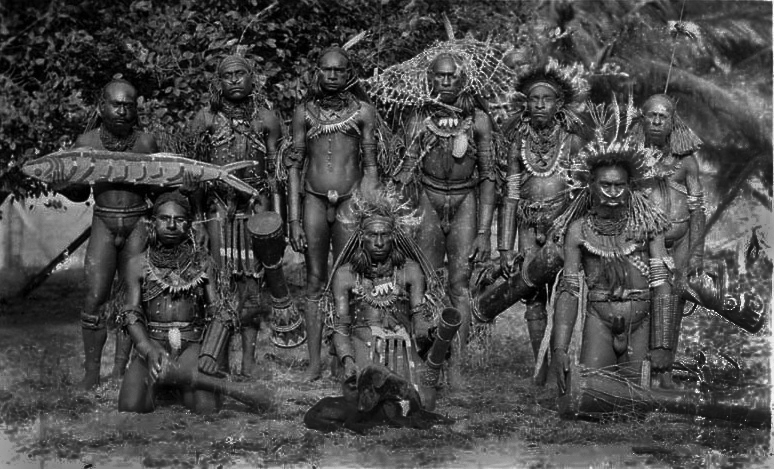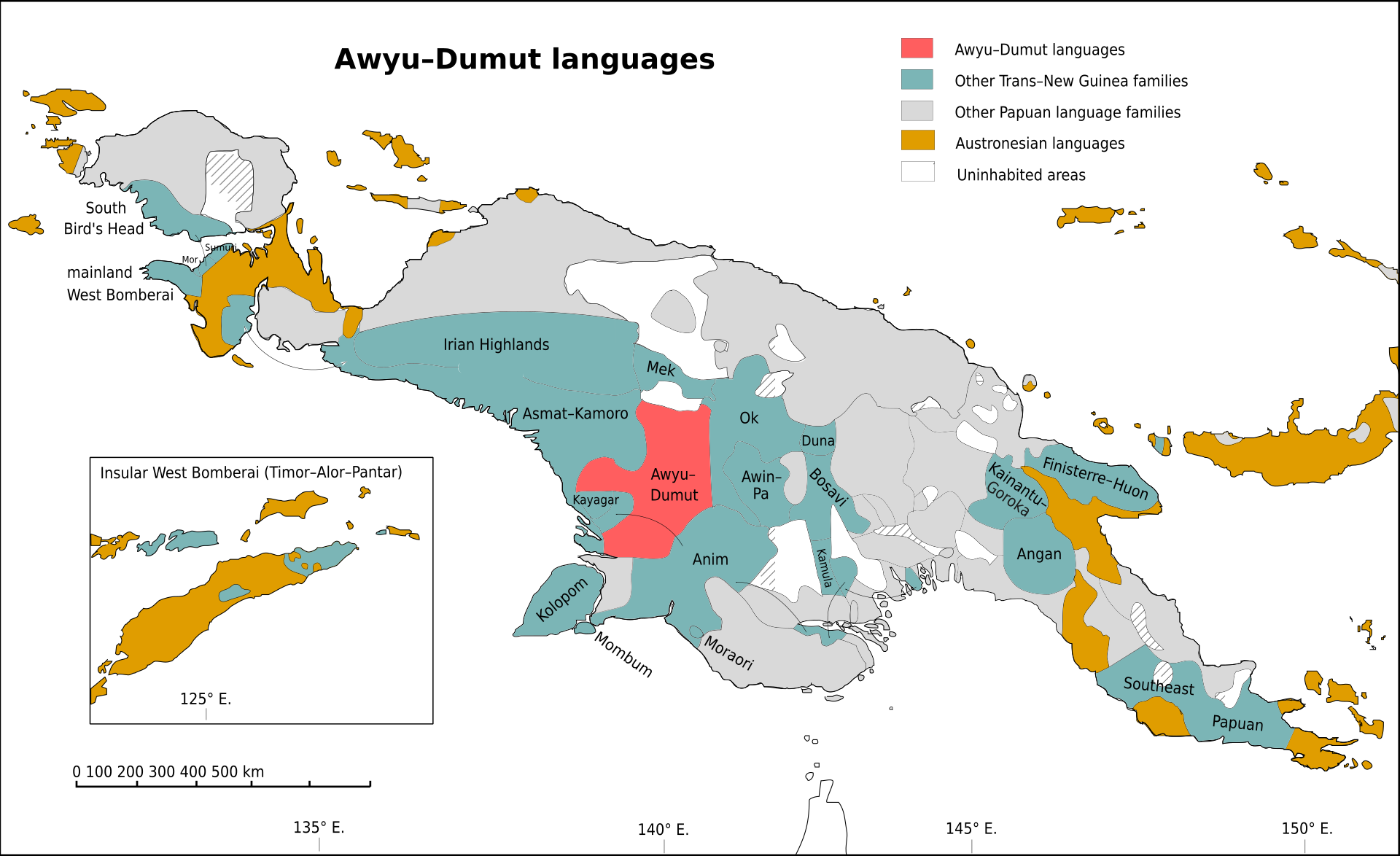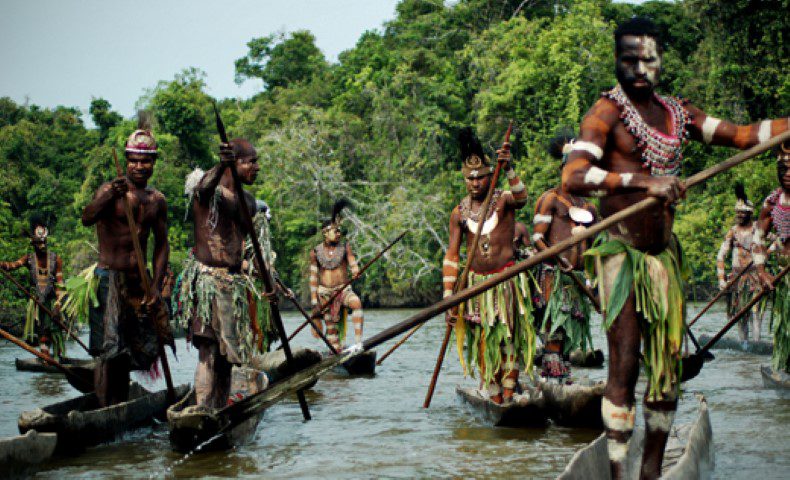 |
| A Marind tribe sharing a southern border with the Sawi tribes of Papua, New Guinea |
The Sawi, or Sawuy, are a tribal people of Western New Guinea, Indonesia. They were known to be cannibalistic headhunters as recently as the 1950s. They speak the Sawi language, which belongs to the Trans-New Guinea language family.
Sawi, or Sawuy, is a language of the Sawi people of the Trans–New Guinea phylum spoken in sago swamps in the southwestern parts of the Indonesian province of Papua. Of the neighboring languages, it is most closely related to the Awyu languages to the east.
Sawi is an inflecting language and uses both inflections of the stem and suffixes to indicate person, number, and tense.



 |
| A peace child offering among the Sawi tribe of Papua, New Guinea |
Journey into the Unknown
I remember reading Don Richardson's story of Peace Child either in my late teens or early twenties and thinking how wonderful his use of the cultural elements he lived within to communicate Jesus not by his own Western standards but by the tribe's own standards whom he had befriended.
I remember reading Don Richardson's story of Peace Child either in my late teens or early twenties and thinking how wonderful his use of the cultural elements he lived within to communicate Jesus not by his own Western standards but by the tribe's own standards whom he had befriended.
Yet in another sense I also remembered how the Sawi tribe was "fattening him and his family up" with good fellowship and tribal affection as they were preparing Don, his wife, and youngest child Steve, for a rite of death. Though Don never mentions this in his journal the tension was evidently there by his recounts of what he was witnessing. The Sawi tribe he was living amongst were a Papua, New Guinea tribe of Indonesia well know for their cannibalism.
It was through a cannibalistic incident between the Sawi tribes where Richardson first saw a glimmer of how to share the deep relevance of Jesus to his machiavellian hosts which might bring a deep spiritual meaning to upsetting both the human soul and tribal practices of a culture devoted to premeditated murder upon one another. And it was through this biblical form of typology that opened blinded tribal eyes to see the atonement of Jesus between God and man.
But rather than ruin or spoil the import of Richard's story I'll leave it to the reader to pick up an old copy and re-explore through Don Richardson's missionary eyes the perils he and his family had entered into amid the discoveries they had made having survived their first Sawi encounters. Peace Child reads simply and quickly, but within the words of the page lies a deep sublimity providing a transitional context between people and tribes of unlike cultures looking to find common ground with one another.
Context
Which brings me to my last thought of the day. Context. If, like Don Richardson, we are seeking a way to share the gospel of God's love through Jesus in a meaningful way, it is by listening and learning from within whatever cultural context (of community context) we find ourselves in. This is where an evangelist or missionary, pastor or discipler, might begin. It will never be obvious at first but with time and insight it might become obvious.
The key to Richardson's insight was that he came to live and work within the Sawi tribes. When he did, he found God's insight into a deeply formative tradition held within the very cornerstone of the Sawi tribes. An identity heightened by lies and deception before killing of another human being. It was this very cornerstone of their tribal identity the Lord reveal to Don that he might use it's same evil to share God's love.
Had Richardson brought his own culture into the tribe he might never have exposed himself to its hazards and reality. Further, Richardson could have recited the "law and order" sections of the bible's Hebraic traditions and simply forced his own Christianized Western culture upon the Sawi. But by proceeding through love and fellowship he exposed himself to the very evil lying resident among the tribes of Papua needing redemption. If he had not done this, the gospel wouldn't have been anything more than window-dressing added to craven human behavior and customs.
Context? Context is everything. Isn't it?
R.E. Slater
June 8, 2020
* * * * * * * * * * * * *

Never The Same:
Celebrating 50 Years Since Peace Child
Pioneers USA
Dec 12, 2012
The Sawi were headhunters and cannibals when a young couple named Don and Carol Richardson arrived in their village carrying their seven-month-old boy Steve—and a message that would change the tribe forever. The year was 1962, and Steve—and later, three more children—spent their youth among the Sawi, learning the language and embracing the culture in ways that would shape the rest of their lives. Their story was immortalized in the best-selling book Peace Child and a feature film of the same name, inspiring a new generation to take the gospel to the remaining isolated tribes of the earth.


Fifty years later, Steve joins his father, Don, and two brothers, Shannon and Paul, to visit the Sawi village where they grew up. What is the state of the church they planted among the Sawi? Are the friends they played with still alive? Will anyone remember the mark their family left on the tribe? Journey with Steve as he travels to the swamps of Papua, Indonesia, to introduce you to the Sawi, and explore the impact of the gospel among a previously unreached people group.
- For more information on Pioneers, visit http://pioneers.org.
- Check out "Never the Same" on Facebook at http://facebook.com/neverthesamemovie
- To order "Never the Same" on DVD or Blu-ray Disc, visit http://pioneers.org/store.
Music Credits
- "A Beautiful Tale" and "Revival" by Ryan Taubert © 2012 SHOUT! Music Publishing Courtesy of SHOUT! Music Australia
- "O My Soul", "The Introductions" and "Moving Frames" by Adam Taylor, used with permission
- "The Father's Heart" by Tony Anderson, used with permission
- "The Ladder" by Drake Margolnick, used with permission
* * * * * * * * * * * * *
Never The Same: Celebrating 50 Years Since Peace Child
Missionary Visits Cannibal Tribe 50 Years Later
Moira Brown speaks to Don Richardson about his life's
work as a missionary and the impact it has had worldwide.
Don Richardson-Author / Conference Speaker
Books: "Peace Child" & "Eternity In their Hearts"
To Get Your Copy:
* * * * * * * * * * * * *
 |
| Amazon Link |
 |
| DVD Link |
In 1962, Don and Carol Richardson risked their lives to share the gospel with the Sawi people of New Guinea. Peace Child tells their unforgettable story of living among these headhunters and cannibals who valued treachery through "fattening" victims with friendship before the slaughter. God gave Don and Carol the key to the Sawi hearts via a redemptive analogy from their own mythology. The [Sawi's] "peace child" became the secret to unlocking a value system that existed through generations over centuries, possibly millenniums, of time. This analogy became a stepping-stone by which the gospel came into the Sawi culture and started both a spiritual and a social revolution from within. With an epilogue updating how the gospel has impacted the Sawi people, Peace Child will inspire a new generation of readers who need to hear this unforgettable story and the lessons it teaches us about communicating Christ in a meaningful way to those around us.